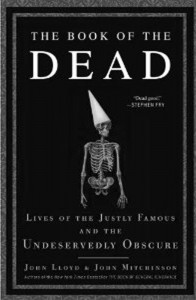 The authors of “If Ignorance is Bliss, Why Aren’t There More Happy
People?” have written another book that elaborates on our
understanding of people – but this time, they’re dead.
The authors of “If Ignorance is Bliss, Why Aren’t There More Happy
People?” have written another book that elaborates on our
understanding of people – but this time, they’re dead.
The “Book of
the Dead” by John Lloyd and John Mitchinson profiles 68 dead people,
and tells us engaging, humorous and sometimes bizarre stories about
“the lives of the justly famous and undeservedly obscure.”
The book’s chapters have titles which unite the profiled people’s
stories in one way or another. The first chapter, “There’s Nothing
Like a Bad Start in Life” is about those who have come from very
humble beginnings, to say the least. Leonardo da Vinci had an absent
father and poor mother, and Isaac Newton had a lonely childhood, with
no stable home and constant bullying in school.
Another chapter, “Grin and Bear it”, tells the stories of historical
figures who have had to overcome an illness, disability or mental
impairment. Interestingly enough, one of history’s earliest healthcare
icons, Florence Nightingale, was bedridden for half of her life with a
disease now called Brucellosis, which is chronic weakness caused by a
bacterial infection. It is suspected Nightingale contracted this
disease by drinking unpasteurized milk while working in the military
hospital during the war.
Not all of the chapters are serious, with perhaps the silliest chapter
called, “The Monkey Keepers.” All of the people in this chapter either
owned monkeys or had an odd affection for them. Unable to carry a
child to term and deeply distraught, Frida Kahlo’s maternal instincts
were eventually dedicated toward her pet monkeys, whom she often
painted fondly.
This book delves into interesting details that aren’t brought up in
traditional academia. Whenever we learn about historical figures, we
mostly concentrate on their contributions to society, their big rises
and downfalls, and ultimately what they have accomplished. Taking a
look at the personal lives and struggles of some of history’s most
iconic figures makes them all the more human.
This book brought to life the importance of self-worth and
determination. Many of the men and women profiled in this book came
from broken homes, had no family, friends or formal education, yet
they were able to accomplish something great. Some of these people had
terrible fears, phobias and insecurities but were able to overcome
them and become some of the people that we continue to learn about
centuries after their death.
Half of the people profiled in this book
were great scholars and geniuses that never gained the same fame as
some of their peers, also reminding us that life is not fair. Still,
all of these people, famous or not, showed us that everyone has an
opportunity to achieve something and make a name for themselves.
Among the different lessons stands one common theme: death is
ultimately the ending to all life stories. No matter who we are in
this life, we will end up just like Leonardo da Vinci, H.G. Wells, and
Sigmund Freud – dead! If we are lucky, we may take up a paragraph or
two in history books, too.
“Book Of The dead” Kills Boring History Books
September 23, 2010
More to Discover










